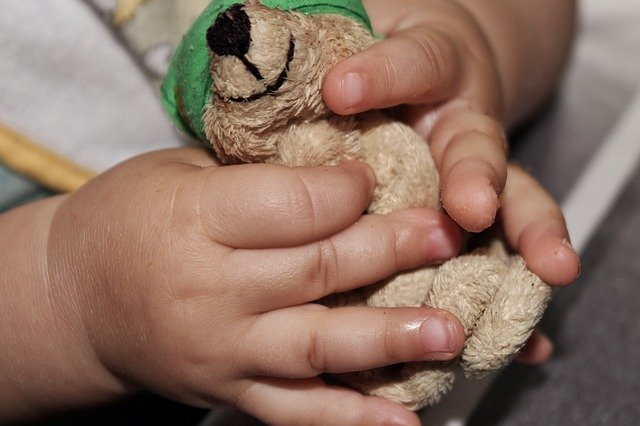I can’t recall the specific age I started biting my nails but by age 10, I’d been doing it long enough that it had been going on for years according to my mum. In that regard, I probably started biting my nails around age 5 or so and maybe earlier. I don’t come from a family of nail biters – neither of my parents did it and neither did my sister – and I didn’t live near extended family so I didn’t get it from them either.
Nail Biting Treatment For Toddlers
A toddler is generally defined as a child between the age of 1 and 3 years old. Some consider 4 year olds to also be toddlers but for the purpose of this article, let’s just consider a toddler to be a young child around that age and discuss what to do when your toddler bites their nails.
Strategies to help a toddler stop nail biting are different than for adults since it involves you first finding out why your child is doing it. Then you need to help them understand that they shouldn’t do it while avoiding encouraging them to do it more frequently which often results when you tell a child to stop doing something.
If you have an older child who bites their nails, please read my article How To Stop A Nail Biting Child as the strategies for them to quit are slightly different than for a toddler.
Why Do Toddlers Bite Their Nails?
Children tend not to bite their nails before age 3. So technically, the odds of a toddler biting their nails is pretty low. Toddlers tend to bite their nails for the same reasons adults do with a few additional ones. They tend to bite their nails to:
- Deal with teething and mouth pain.
- Mimic when they see their parents or friends doing it.
- Deal with stress, anxiety or nervousness.
- Combat boredom when they have nothing to do.
- Try something new that they’re curious about.
Help Your Toddler Quit Nail Biting
Just like the hands in the cookie jar analogy – if you tell your child not to take the cookies, they’ll take the cookies – helping a toddler to stop nail biting often doesn’t work with the hard approach. And nail biting in children is quite common. Some studies suggest it is as high as 30% for children once they turn 7. By the age of 10, more boys bite their nails than girls.
Here are some things to do to help your toddler stop nail biting.
Understand triggers: Pay attention to when you see your child biting their nails or just putting their hands in their mouth. Look for common occurrences and triggers to either avoid them or minimize them. Keep your toddler busy with their hands so they don’t resort to biting their nails when bored or unoccupied
Trim their nails frequently: As with adults, keeping their nails short may dissuade them from biting them. The shorter they are, the less there is to bite. In the case of girls, you might consider allowing them to use nail polish as it may also help to dissuade them from biting painted nails. Look for non-toxic nail polish to be safe.
Look for other issues: Research has shown that while there isn’t evidence that nail biting causes emotional and behavioral problems, children who bite their nails do tend to have a higher degree of emotional and behavioral problems. It’s something to be aware of.
Speak privately with a professional: Although I haven’t read specifics on this, I can speak for myself. Speaking privately with (for example) your child’s dentist and asking them to ask your child at their next dental visit if they bite their nails might be a strategy that works. While your toddler or young child won’t be interested to learn about the research on the dangers to your teeth and mouth, nail biting can damage teeth. As a child I tended to defer to adults and had I been told by my dentist (for example) that I needed to stop my nail biting or risk damage at a young age, I may have listened.
Do nothing: Many children who bite their nails will eventually just quit on their own. It’s not uncommon for children to put their hands in their mouth, bite their nails, etc and then just stop. As mentioned, biting nails is common among children and suddenly quitting the habit is too.
Things To Avoid
Research has shown that punishing or embarrassing kids to stop nail biting doesn’t work and may have the opposite result: They dig their heels in and bite their nails even more.
Bitter nail polish: It may work but then again they may just start picking their nails in response. And if they’re too young to understand the concept of the bitter nail polish, they may associate putting anything in their mouth – like food – as being bad tasting and then you’ll have an additional problem to solve.
Summary
So helping your toddler quit nail biting is just that: Helping them rather than forcing them or coercing them into quitting. The approach you take is different than it would be if your child was older and more mature. Understanding why they bite their nails is key. Doing nothing might be a strategy to consider as kids do often stop biting nails on their own. An outsider like a dentist or teacher may also help if they speak with your child regarding their nail biting.
Recent Posts
Stimming, short for self-stimulatory behavior, refers to repetitive or rhythmic movements or sounds that some individuals with autism or other neurodevelopmental conditions engage in. It is often...
Nail biting and nail picking is a common habit that affects many people, especially during times of stress or boredom. While it may seem like a harmless habit, it can actually have negative...


